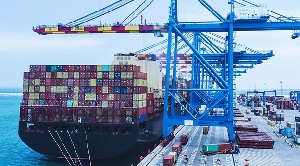Business News of Tuesday, 13 May 2025
Source: www.ghanawebbers.com
Implications of FDI for the shipping sector in Ghana
Foreign Direct Investment (FDI) in Ghana's Shipping Sector
Foreign Direct Investment (FDI) is crucial for boosting economies, including Ghana's. While FDI aids growth, it also brings challenges, especially in shipping. This sector is vital for international trade and economic development. Profit repatriation from FDI can significantly impact Ghana’s local economy.
Impact of FDI on Shipping
FDI has modernized Ghana’s shipping and logistics infrastructure. It attracts foreign shipping lines and logistics companies to operate here. These investments introduce new technologies and improve operational efficiencies. However, a major challenge is the repatriation of profits by foreign investors.
Capital flight from profit repatriation strains Ghana’s economy. Most shipping lines in Ghana are owned by multinationals. They must send profits back to their parent companies, especially if listed abroad. Although legal, this practice can harm Ghana's economy over time.
Shipping companies generate substantial profits in Ghana but rarely reinvest them locally. Instead, they transfer these profits back to their home countries. This outflow worsens economic issues like low foreign currency reserves and cedi instability.
Pricing Control and Economic Impact
Shipping companies often set prices for services like carriage and handling. Their control over the market can lead to high costs for shipping goods to and from Ghana. Local businesses, especially exporters, suffer from rising shipping costs, reducing their competitiveness globally.
Increased import costs due to higher shipping charges also strain the local economy and contribute to inflation. Foreign dominance in the industry means that local ports may prioritize international company needs over local interests.
While infrastructure improvements are significant, they often do not focus on long-term benefits for Ghana’s shipping industry. High profit repatriation suggests a lack of interest in further investment in local development.
Investment Distinctions
It is essential to differentiate between large capital investments in port infrastructure and smaller commercial presences like shipping agencies. The latter require minimal investment but often result in significant fee repatriations without strong regulations.
Global Perspectives on FDI Challenges
Ghana's challenges with profit repatriation are not unique; other countries face similar issues. Indonesia experienced a currency crisis influenced by capital outflows from FDI profit repatriation in 2013. Brazil faced currency depreciation due to large-scale profit repatriations between 2015-2016.
These examples highlight the need for robust regulatory frameworks that balance FDI benefits with domestic economic protection against destabilizing capital flows.
Role of the Ghana Shippers' Authority
The Ghana Shippers' Authority (GSA) regulates the shipping sector while balancing local business interests with those of international companies. Under the new GSA Act 2024 (Act 1122), it aims to adopt global trends for a transparent business environment.
The GSA will work with other regulatory bodies to promote transparency and competition within the sector. A multi-faceted approach is necessary through strengthened regulations and collaboration among stakeholders involved in the shipping value chain.
Conclusion
FDI can transform Ghana’s shipping sector by bringing capital, technology, and expertise. However, without careful regulation, profit repatriation could lead to severe economic challenges like currency depreciation and financial instability.
The GSA plays a vital role in overseeing shipping activities while promoting policies that benefit both foreign investors and Ghana's economy. With effective regulatory frameworks and stakeholder collaboration, Ghana can maximize FDI potential while ensuring long-term economic stability.











